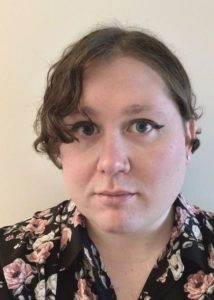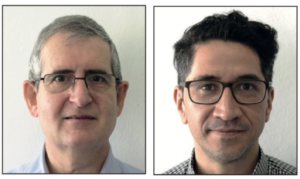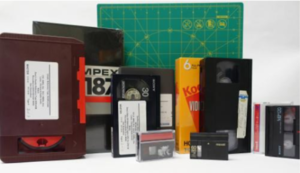NDSA Announces Winners of 2019 Innovation Awards
For release October 16, 2019
The NDSA established its Innovation Awards in 2011 to recognize and encourage innovation in the field of digital stewardship, https://ndsa.org/awards/. Since then, it has honored 34 exemplary individuals, institutions, projects, educators, and future stewards for their efforts in ensuring the ongoing viability and accessibility of valuable digital heritage.
Today, NDSA adds 5 new awardees to that honor roll during the opening plenary ceremony of Critical Junctures, the NDSA’s 2019 Digital Preservation Conference, https://ndsa.org/meetings/.
Individual Innovation Award
The NDSA Individual Innovation Award honors individuals making significant, innovative contributions to the digital preservation community. Two worthy individuals are recognized this year.

Dr. Dinesh Katre, Senior Director and Head of the Department of Human-Centred Design and Computing (HCDC) Group at the Centre for Development of Advanced Computing (C-DAC) in India, has established a distinguished record leading the development of innovative technological solutions for digital preservation, trustworthy digital repository certification, data repurposing and intelligent archiving. Over the last several years, he has worked to advocate for, develop, and deploy the Indian National Digital Preservation Programme, which provides a robust and comprehensive platform for the effective long-term preservation of the digital materials. As Chief Investigator of the Programme’s flagship project to establish a Center of Excellence for Digital Preservation, Dr. Katre led the process to develop a digital preservation standard for India, as well as domain-specific archival systems and automation tools for digital preservation. He also conceptualized, designed and led the development of DIGITĀLAYA, a software framework, which comprehensively implements the OAIS reference model. DIGITĀLAYA has been customized for preservation of electronic office records, audiovisual and document archives and e-governance records. Katre’s efforts culminated in the first repository in the world to achieve ISO 16363 certification. His achievements exemplify the growing international reach of concern and practice in the areas of digital stewardship and preservation.

Tessa Walsh is a digital archivist and preservation librarian with varied experience at Harvard, Tufts, the University of Wyoming, and currently, Concordia University. She is also a prolific software developer, and this capacity has created, and made freely available through her BitArchivist website and Github, an evolving suite of robust open source tools meeting many core needs of the stewardship community in appraising, processing, and reporting upon born-digital collections. Her projects include the Brunnhilde characterization tool; BulkReviewer, for identifying PII and other sensitive information; the METSFlask viewer for Archivematica METS files; SCOPE, an access interface for Archivematica dissemination information packages; and CCA Tools, for creating submission packages from a variety of folder and disk image sources. Taken together, these tools support a very wide gamut of both technical and curatorial activities. The open availability, documentation, support, and community engagement for a growing ecosystem of mature preservation tools is critical to the successful and sustainable stewardship of the digital materials so critical to contemporary and future commerce, culture, science, entertainment, and education. This work also provides an excellent example of how a lone individual can nevertheless make a substantial positive impact on the complex domain of stewardship practice through dedication, skill, enthusiasm, and community spirit.
Organization Innovation Award
The NDSA Organization Innovation Award honors organizations taking an innovative approach to providing support and guidance to the digital preservation community. Today we recognize two organizations.


The Asociación Iberoamericana de Preservación Digital (APREDIG) is a nonprofit Ibero-American association founded at the end of 2017 in Barcelona, Spain, with the intention of promoting the importance of digital preservation in Spainish-speaking countries. Its activity has culminated in projects and activities to disseminate a Spanish translation of the original NDSA Levels of Preservation, opening-up significant new opportunities for expanding digital stewardship best practices, and subsequent outcomes, by practitioners in Spain and Latin America. Led by Dr. Miquel Termens and Dr. David Leija (Universitat de Barcelona), this group of volunteers, researchers, and disseminators of best practices for digital preservation have created an online self-assessment tool to help Institutions of Spain and Mexico understand recommendations, key concepts, and simple diagnosis of digital preservation practices using the NDSA Levels as a guideline. The critical importance of effective and sustainable solutions for preserving digital materials transcends institutional and national boundaries. APREDIG’s efforts are a vital example of the growing international reach of stewardship and preservation concerns and applications. Furthermore, they evidence the positive contribution to local and global understanding resulting from the expansion of the community of theory and practice to all interested and engaged participants.

The idea for a Software Preservation Network (SPN) originated 2014, Since then, it has developed into a vibrant grassroots organization of digital preservation practitioners invested in the future of software preservation. Through multiple federal grants and start-up seed funding, SPN has solidified alliances among international stakeholders—both individuals and organizations—with diverse perspectives, including libraries, archives, and museums. Two separate, but complementary, aspects of SPN’s work are particularly noteworthy. First, its innovative efforts to develop effective techniques and programs for the long-term stewardship of the intermediating software upon which preserved digital resources are inextricably dependent, exemplified by publication of the Code of Best Practices for Fair Use in Software Preservation, and the Emulation-as-a-Service Infrastructure (EaaSI) project researching scalable emulation. Second, Jessica and Zack place critical emphasis on issues of community engagement and organizational sustainability. This work provides an extremely useful case study to the stewardship community of the importance of thoughtful and iterative self-reflection and refinement of organizational strategies, goals, processes, and initiatives to ensure the continued relevance, value, and persistence of programmatic efforts. SPN offers a model for digital stewardship that combines steadfast vision with flexibility and an emphasis on the evolving needs of the organization’s constituents. The award was accepted on behalf of the entire SPN organization and its members by Jessica Meyerson (Educopia Institute) and Zach Vowell (California Polytechnic State University).
Project Innovation Award
The NDSA Project Innovation Award honors projects whose goals or outcomes represent an inventive, meaningful addition to the understanding or processes required for successful, sustainable digital preservation stewardship.

Since its inception in 2016, the Great Migration Home Movie Project (GMHMP) at the Smithsonian Institution’s National Museum of African American History and Culture (NMAAHC) has digitized hundreds of hours of African American home movies and thousands of photographs for families who have visited the Museum in Washington and for those who live across the country, in Baltimore, Denver, and Chicago. In its current iteration, families visiting the Museum are invited to drop off their home movies and films, videotapes, and audiotapes when they arrive for the day, and then pick up their original and digital copies (preserved by a team of professionals) at the end of the day — with the added invitation to donate digital copies to the Museum, enriching its growing collection of vernacular home movies. As explained by Walter Forsberg, founder of the NMAAHC’s Media Conservation and Digitization department, the Great Migration Home Movie Project lowers the “technological barriers-to-entry of audiovisual digitization and directly and proactively addresses the historic obfuscation and exclusion of people of color from traditional archives.” It is thanks to the work of the Great Migration Home Movie Project that not only can these memories be gifted back to families and their future descendants, but, also, that “history is being re-written in a very real and immediate way.” The award was accepted on behalf of the entire GMHMP project team by Candace Ming.
The NDSA Innovation Awards Working Group was led by co-chairs Stephen Abrams (Harvard University) and Krista Oldham (Clemson University), with members Samantha Abrams (Ivy Plus Libraries Confederation), Lauren Goodley (Texas State University), Grete Graf (Yale University), and Kari May (University of Pittsburgh). Aliya Reich at CLIR provided administrative support for the entire awards process.
Please join the Working Group in congratulating the 2019 Innovation Award winners!
